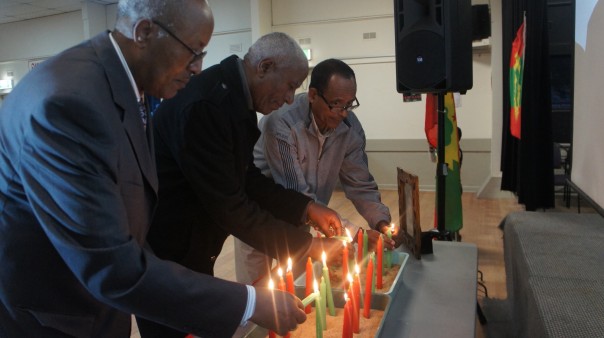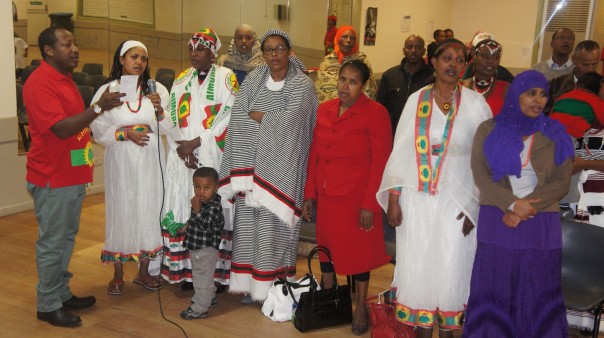Monthly Archives: April 2013
Norway: Police stopped Woyane meeting in Tasta Bydelshus
(April 21, 2013, Aftenbladet – Google translation) – Around 300 Ethiopian’s stopped the meeting in stavanger Norway for fundraising for Abay dam which is called by representatives from the Ethiopian Embassy in Stockholm Abay Mebrat Beyene.
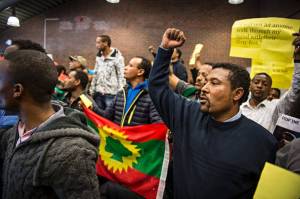 The police feared that it would get completely out of control when people in the audience went to the hard verbal confrontation against two representatives from the Ethiopian Embassy in Stockholm who had called for and chaired the meeting.
The police feared that it would get completely out of control when people in the audience went to the hard verbal confrontation against two representatives from the Ethiopian Embassy in Stockholm who had called for and chaired the meeting.
The police gave the first message that all protesters to leave the meeting while the two embassy people and their potential supporters can be seated. This denied the attendees protesters, and several feared it would come to an open confrontation between police and people in the audience. Then, specific efforts manager Øyvind Sveinsvoll of Rogaland police to stop the meeting and clear the room.
It was a wise decision, said several of those present protesters. They did not want the two embassy people should be left as “victors” while they were evicted.
The atmosphere was tense that the police chose to isolate the two embassy people from the rest of the participants. They escorted them out to a private car that carried them away from the area. The 300 attendees were then drop out of the courtroom.
There was general consul at the Ethiopian Embassy, Abay Mebrat Beyene, who would chair the meeting with embassy secretary. The main theme was collecting money in the Ethiopian exile to a very controversial oppdemningsprosjekt – a prestige project for the regime in Ethiopia.
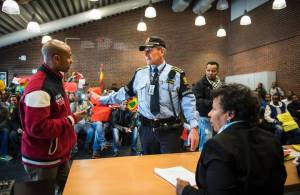 The Ethiopian authorities have tried to keep similar “recovery meetings” both in South Africa, Saudi Arabia, the U.S. and Germany, and each time meetings have ended in massive demonstrations against human rights violations in Ethiopia. People imprisoned without trial, free elections are abolished, freedom of speech likewise, newspapers are state controlled and hundreds of journalists imprisoned.
The Ethiopian authorities have tried to keep similar “recovery meetings” both in South Africa, Saudi Arabia, the U.S. and Germany, and each time meetings have ended in massive demonstrations against human rights violations in Ethiopia. People imprisoned without trial, free elections are abolished, freedom of speech likewise, newspapers are state controlled and hundreds of journalists imprisoned.
Several took the floor during the meeting the key bydelshus and said this was not a voluntary fundraising. Those who did not pay the money, you could expect problems when they contacted the embassy to obtain a passport or ID papers.
Saturday’s meeting was the first of its kind in Norway. And exiled Ethiopians came in separate buses from Oslo, others came from Steinkjær, Otta, Stord and Bergen other part of Norway to demonstrate in Tasta bydelshus stavanger against the regime in Ethiopia.
28. April, the Ethiopian Embassy in Stockholm hold a similar meeting in Oslo.
http://www.aftenbladet.no/nyheter/lokalt/stavanger/Politiet-stoppet-mote-i-Tasta-bydelshus-3162548.html#.UXNWgrV9FrO
Oromian Pragmatic Way of Honoring National Heroines and Heroes
By Fayyis Oromia*
As we do now prepare ourselves to celebrate Guyyaa Gootota Oromoo (the day of honoring the Oromo national heroines and heroes), we can reflect on the significance of the commemoration and its impact on the future Oromo national liberation movement. The highlight of the history to be remembered in order to comprehend why we do honor this day is: “In April 1980 a ten-member high-ranking military and political delegates of the OLF were on their way to Somalia to meet with political leaders there when they were captured by Somali bandits in Shinniga desert (in Ogaden). The bandits finally ordered the Muslims and Christians to segregate before their executions. The Oromo comrades chose to stay together and face any eventualities than identifying themselves as nothing else, but Oromo. On the day of April 15, all the ten were executed and their bodies thrown into a single grave.”
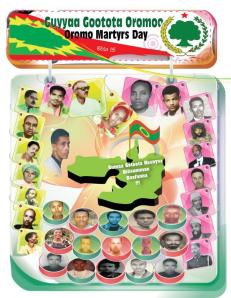 Before writing about how to honor national gootota, let me operationally define what goota (a singular form of gootota) means: the term hero refers to characters, who in the face of danger and adversity or from a position of weakness, display courage and do have the will for self sacrifice — that is, possess heroism — for the sake of a greater good of certain collective or that of all humanity. This definition originally referred to martial courage or excellence, but extended to more general moral excellence. Stories of heroism may serve as moral examples; politicians of all countries have already employed honoring a hero for their own apotheosis; here Oromo politicians are no different. But, interesting is to observe that even Abyssinians do use the Afan Oromo terms called jabduu (courageous action) andjagina (courageous person), the words which depict the fact that the Oromo people under the democratic rule of the Gadaa system were the known gootota in defending their nation from all possible attacks from alien forces. This Oromo tradition of being goota is not still broken, despite a national subjugation under Abyssinian colonizers being supported by Western imperial regimes, for the last one-and-half century. Gootota Oromo, who showed courage under such dire situation, do deserve our national respect.
Before writing about how to honor national gootota, let me operationally define what goota (a singular form of gootota) means: the term hero refers to characters, who in the face of danger and adversity or from a position of weakness, display courage and do have the will for self sacrifice — that is, possess heroism — for the sake of a greater good of certain collective or that of all humanity. This definition originally referred to martial courage or excellence, but extended to more general moral excellence. Stories of heroism may serve as moral examples; politicians of all countries have already employed honoring a hero for their own apotheosis; here Oromo politicians are no different. But, interesting is to observe that even Abyssinians do use the Afan Oromo terms called jabduu (courageous action) andjagina (courageous person), the words which depict the fact that the Oromo people under the democratic rule of the Gadaa system were the known gootota in defending their nation from all possible attacks from alien forces. This Oromo tradition of being goota is not still broken, despite a national subjugation under Abyssinian colonizers being supported by Western imperial regimes, for the last one-and-half century. Gootota Oromo, who showed courage under such dire situation, do deserve our national respect.
Accordingly, the purpose of honoring gootota Oromo of the April 1980 as well as their likes is, firstly, to express our gratitude to their life-sacrifices for the cause of bilisummaa Oromo, and secondly, to commend and recognize the exemplary and unswerving unity expressed in their refusal to be divided and separated per region and religion. The currently living Oromo nationalists, who have nowadays become the entertainers of the dividing and fragmentalizing manipulation of our enemies, need to learn from these legendary Oromo leaders, so that we all can start to resist any sort of polarization per region, party politics and religion. Fortunately, it is clearly to be seen that the Woyane’s attempt to divide the Oromo nationals by using the cards of region and religion has already failed, but enemy’s application of the card of politics, i.e. dividing the Oromo nationalists as pro-independence vs. pro-union seems to work still. Knowingly or unknowingly, Oromo freedom fighters seemingly fall in to this trap. It is the result of such division, what we have seen over the last two months as a discord between the existing OLF factions, which are now opting to promote either exclusive independence or exclusive union, instead of being together and fight against the archenemies of the Oromo nation in unison.
But still, I would like to encourage Oromo freedom fighters to try to come to our senses and abolish this division for the sake of honoring our martyred leaders, who taught us how to resist such manipulation of our enemies by opposing the maneuver used to divide us and destroy the Oromo national liberation movement. If we learn from our gootota and say big ‘NO’ to any sort of discord among us, this can really be the pragmatic, not only the rhetorical, way of celebrating the deeds of our heroines and heroes. What do I mean here by pragmatism? The word pragmatism is derived from Greek pragma, meaning deed or action, which comes from prass? = to pass over, to practice, to achieve. It is a philosophical tradition centered on the linking of practice and theory. It describes a process where theory is extracted from practice, and applied back to practice to form what is called an intelligent practice (an evidence-based action according to the scientific realities on the ground).
In this sense, we can extract the theory of ‘unity in diversity disregarding the difference in region, politics and religion’ from the practice done by our gootota, and then apply it back to practice for the sake of promoting the Oromo national liberation movement. This is what I call a pragmatic way of honoring ourgootota. I think our hitherto ways of honoring the martyrs was mainly only verbal and mostly a virtual yearly commemoration, which is simply practiced in a ceremonial way. To make the way of celebrating our gootota be fruitful for QBO, I would like to recommend that, from now on, the honoring be in the following practically useful, i.e. pragmatic, ways:
– we better try to honor our gootota practically in the form of strengthening WBO/OLA (Oromo Liberation Army), the presently living heroines and heroes, instead of only narrating about the best ones of the past history. Furthermore, we can honor them by following their example of being martyrs together, i.e. refusing to be divided based on region, politics and religion. Just as our gootota demonstrated to us never to fall into the trap of the religious divide (Christian vs. Muslim), may Waaqa give us the wisdom also not to fall into the currently ongoing trap of political divide (as pro-independence vs. pro-union). Just like the OLF was accommodative of both the Christian and Muslim Oromo nationalists, it needs to be inclusive, in the future, regarding the pro-independence and pro-union Oromo nationalists. Both these political camps can demonstrate to the Oromo people that they are ready to sacrifice their lives by working in one and the same national liberation front, so that giving Oromummaa the priority to their favorite type of Oromian sovereignty, which they respectively will realize per public verdict after achieving bilisummaa Oromo together.
– we better strive to dedicate, commit and devote ourselves to the Oromo cause, for which thegootota gave their lives, especially in consolidating and re-uniting the vanguard national liberation front of our people – the OLF, in order to make it accommodative of all the three existing forms of factions (pro-independence, pro-self-determination and pro-union), but encouraging this inclusive OLF to use the three cards effectively based on the right timing and objective reality. As I put in my last opinion, I do still believe that one accommodative, re-united and inclusive OLF can be more efficient than the currently fragmented three separated factions with their three quasi exclusive objectives. Let alone the effectiveness of the structurally inclusive OLF, even accepting and respecting the move of the OLF-mindset of bilisummaa doing its liberating business, be it in the ruling OPDO way, in the opposing OFC way or in the disintegratedly rebelling OLF ways of the pro-independence, pro-self-determination and pro-union factions, is constructive approach of honoring the martyrs in a better manner.
Additionally important is a good investment of our talent and time on cultivating and producing the necessary future generation Oromo heroines and heroes, who will be ready to be martyrs for the cause of bilisummaa, rather than being so docile and live under the ongoing gabrummaa (slavery) / kiyyummaa(colony). To materialize this, a sort of cultural transformation is yet needed, in which the whole Oromo society at large can be converted back towards being fierce freedom fighters, as we were under theGadaa system, abandoning the presently mild way of our traditional walking on ‘karaa nagaa’ (on avenue of peace). The original meaning and importance of ‘karaa nagaa’ is actually embedded in theGadaa system with its strong military culture to defend the Oromo nation. Now, the Gadaa structure is already dismantled, and we being under garbummaa and talking about ‘karaa nagaa’ is a misconception. The true sense of the conception can be applied in the future Gadaa republic of Oromia, but not now in the colonial system of the Ethiopian empire. Similarly, re-appraisal and re-definition of some political and religious concepts now used by our colonizers to sustain their system of domination must be undertaken; for instance, the oppressors preaching us about love and unity, but directly or indirectly opposing justice and liberty, while we are under dire colonial situation is simply unacceptable to say the least.
Also, the known Oromo institutions of the three religions (Christianity, Islam and Waaqeffanna) should stop hypnotizing and pacifying Oromo nationals, if they just want to honor our national gootota; rather they ought to teach how to be the best freedom fighters like the some holy personalities, about whom we do read in the holy books (in the Bible, the Daaniyaa and the Qur’an). Fighting for freedom and being martyrs for the cause of bilisummaa Oromo and walabummaa Oromia is one of the righteous measures any Christian, Muslim and Waaqeffataa Oromo can do. So the best way of celebrating our nationalgootota at this phase of garbummaa under Abyssinian colony is to be the best fighters for freedom like them. If we are now, being under oppression, ready to honor them like this, then it will be surely very rejoicing to the Oromo nation in the future, when we will have a chance to celebrate our gootota further, after our national liberation, in the form of Oromo national ceremonies and festivities.
That means, we now need to present our reward for their sacrifice in a form of our full engagement by giving our talent, money and time to the QBO (the Oromo national liberation struggle). The fruitful method to do this is, not only in the Pal-talking and Pal-writing as some of us usually like to do, but through practical steps on the real ground. Besides, we better learn to throw the smallest stone we do have at hand (including our petty verbal attacks) only at the oppressors, especially at the currently tormenting fascist and racist regime in Finfinnee palace, instead of directing our verbal guns at other fellow Oromo nationalist individuals or organizations. Oromo nationalists have to try to forge tokkummaa for bilisummaa, which we can present as our another gift to the national heroins and heroes. To this effect, we should try to clearly differentiate the oppressive forces in the colonizers’ bloc from the freedom fighters in the liberators’ camp, the step which is mandatory for our success in the QBO.
In this subtle differentiation process, we can simply see that any Abyssinian individual or institution opposing Oromo’s God-given right to self-determination is in the colonizers’ bloc, whereas any Oromian, be it pro-independence, pro-self-determination or pro-union, who is opting for this right of the Oromo nation is in the liberators’ camp. Only an Oromo, who is against bilisummaa Oromo, the national freedom which is needed to exercise our right to self-determination, can be considered as a collaborator of the Abyssinian colonizers. Such clarification of the difference between the foes and the friends of the Oromo national liberation movement is necessary at this time, when the Woyane cadres are doing their best to confuse, divide and frustrate the Oromo national liberation camp. It also helps the pro-independence Oromo nationals, who usually tend to be self-righteous and accuse both the pro-self-determination and the pro-union nationalists as collaborator, to moderate their view. The same is true for the pro-self-determination Oromo nationals, who recently started to designate the pro-union Oromo nationalists as betrayers and curse them as collaborators. Let’s stop such non-sense accusations and allegations of each other, if we really want to honor our gootota by presenting to them the near future success story of our national liberation struggle, which we can achieve in unison, as a gift.
In summary, we can try to make each day look like an April 15, which is the celebrated Guyyaa Gootota Oromo, so that we can honor our heroines and heroes continuously with the above mentioned pragmatic steps. These constructive actions can lead us to our common national victory, over our current colonizers, effectively. To have such a triumph against our enemy, we also need to overcome the hitherto impact of the hindering slave (colonized people’s) mentality, such us submissiveness, loss of control on our own issues and learned helplessness. It is such servant mentality of the oppressed people with certainly programmed minds to do bidding of the colonizers, which compel some part of the Oromo nationals to be traitors vis-à-vis the cause of bilisummaa. Being liberated from such slave mentality can help us be the integrators of our national liberation camp, instead of being enemy’s instrument of disintegration and division. May Rabbi help us to be the united fierce freedom fighters, not the fragmented pacifist passive people, who are too docile to accept the life under the garbummaa imposed on us by the Abyssinian ruling oppressors. To put my message in short, the pragmatic national liberation struggle is the best way of honoring the Oromo national heroines and heroes; haa jabaannu!
Galatooma!
* Fayyis Oromia can be reached at fayyis@yahoo.de.
